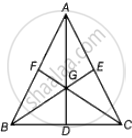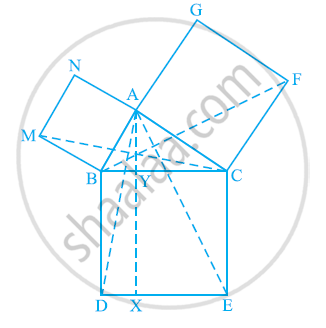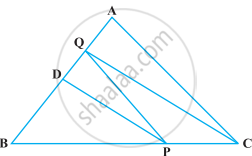Advertisements
Advertisements
प्रश्न
If the medians of a ∆ABC intersect at G, show that ar (AGB) = ar (AGC) = ar (BGC) = `1/3` ar (ABC)
उत्तर
Given: In ΔABC, AD, BE and CF are medians and intersect at G.
To prove: ar (ΔAGB) = ar (ΔAGC) = ar (ΔBGC) = `1/3` ar (ΔABC)
Proof: We know that, a median of a triangle divides it into two triangles of equal area.
In ΔABC, AD is a median
∴ ar (ΔABD) = ar (ΔACD) ...(i)
In ΔBGC, GD is a median
∴ ar (ΔGBD) = ar (ΔGCD) ...(ii)
On subtracting equation (ii) from equation (i), we get
ar (ΔABD) – ar (ΔGBD) = ar (ΔACD) – ar (ΔGCD)
⇒ ar (ΔAGB) = ar (ΔAGC) ...(iii)
Similarly, ar (ΔAGB) = ar (ΔBGC) ...(iv)
From equations (iii) and (iv),
ar (ΔAGB) = ar (ΔBGC) = ar (ΔAGC) ...(v)
Now, ar (ΔABC) = ar (ΔAGB) + ar (ΔBGC) + ar (ΔAGC)
⇒ ar (ΔABC) = ar (ΔAGB) + ar (ΔAGB) + ar (ΔAGB) ...[From equation (v)]
⇒ ar (ΔABC) = 3 ar (ΔAGB)
⇒ ar (ΔAGB) = `1/3` ar (ΔABC) ...(vi)
From eqattions (v) and (vi),
ar (ΔBGC) = `1/3` ar (ΔABC)
And ar (ΔAGC) = `1/3` ar (ΔABC)
Hence proved.
APPEARS IN
संबंधित प्रश्न
XY is a line parallel to side BC of a triangle ABC. If BE || AC and CF || AB meet XY at E and F respectively, show that
ar (ABE) = ar (ACF)
Diagonals AC and BD of a trapezium ABCD with AB || DC intersect each other at O. Prove that ar (AOD) = ar (BOC).
ABCD is a trapezium with AB || DC. A line parallel to AC intersects AB at X and BC at Y. Prove that ar (ADX) = ar (ACY).
[Hint: Join CX.]
Diagonals AC and BD of a quadrilateral ABCD intersect at O in such a way that ar (AOD) = ar (BOC). Prove that ABCD is a trapezium.
In the following figure, ABC is a right triangle right angled at A. BCED, ACFG and ABMN are squares on the sides BC, CA and AB respectively. Line segment AX ⊥ DE meets BC at Y. Show that:-

(i) ΔMBC ≅ ΔABD
(ii) ar (BYXD) = 2 ar(MBC)
(iii) ar (BYXD) = ar(ABMN)
(iv) ΔFCB ≅ ΔACE
(v) ar(CYXE) = 2 ar(FCB)
(vi) ar (CYXE) = ar(ACFG)
(vii) ar (BCED) = ar(ABMN) + ar(ACFG)
Note : Result (vii) is the famous Theorem of Pythagoras. You shall learn a simpler proof of this theorem in Class X.
In a ΔABC, if L and M are points on AB and AC respectively such that LM || BC. Prove
that:
(1) ar (ΔLCM ) = ar (ΔLBM )
(2) ar (ΔLBC) = ar (ΔMBC)
(3) ar (ΔABM) ar (ΔACL)
(4) ar (ΔLOB) ar (ΔMOC)
PQRS is a parallelogram whose area is 180 cm2 and A is any point on the diagonal QS. The area of ∆ASR = 90 cm2.
ABC and BDE are two equilateral triangles such that D is the mid-point of BC. Then ar (BDE) = `1/4` ar (ABC).
In ∆ABC, D is the mid-point of AB and P is any point on BC. If CQ || PD meets AB in Q (Figure), then prove that ar (BPQ) = `1/2` ar (∆ABC).

The medians BE and CF of a triangle ABC intersect at G. Prove that the area of ∆GBC = area of the quadrilateral AFGE.
